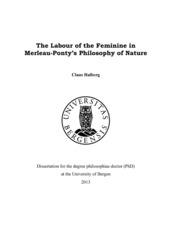| dc.description.abstract | In this thesis I look at the relation between two salient aspects of the work of the French 20th century philosopher Maurice Merleau-Ponty: on the one hand, the philosophical concern with and approach to the problem of nature running through both his early and late texts; on the other hand, his tendency to sexualize and particularly feminize the terms with which he approaches this problem. The hypothesis I defend is that the relation between these two aspects of Merleau-Ponty’s work is not an external relation consisting in an accidental covariation, but is rather an internal relation. I consider the relation internal in the sense that the role played by sexual and feminine motifs on the non-thematic level of his texts dealing with the problem of nature is a genuinely philosophical role, hence that the operation of these motifs cannot be altogether abstracted from the specific outlook of Merleau-Ponty’s philosophical approach to this problem or nexus of problems. The guiding clue for my exposition, in the first part of the thesis, of the problem of nature as defined by Merleau-Ponty is the triangular nexus of issues consisting of the alterity, immemoriality and generativity of nature respectively. I focus on how the concern with nature as an “other” and as an immemorial “past that has never been present” determines Merleau-Ponty’s approach to the problem on the descriptive or phenomenological level, while the concern with nature as generative or productive characterizes the ontological level of that approach. In connection with the latter the published notes from his lectures on the concept of Nature held at the Collège de France during the latter half of the Fifties and his discourse on the flesh as we find it in the manuscripts for The Visible and the Invisible are of key importance. In the second half of the thesis, I provide analyses of how Merleau-Ponty’s approach to the alterity, immemoriality and generativity of nature respectively can be seen in connection with the implicit or explicit presence of sexual and particularly feminine motifs in the texts. I try to show, first, how his phenomenological description of natural alterity implicates a connotation of the fantasy of woman as the seductive yet inaccessible object of male desire, partly by pointing to how Merleau-Ponty’s descriptions resound with similar approaches in Levinas and Nietzsche, both of whom explicitly associate woman with alterity and truth/nature respectively. Second, I look into the way maternal motifs of fecundity, pregnancy and birth are engaged in Merleau-Ponty’s approach to nature as an immemorial past. Third, largely drawing on Luce Irigaray’s reading of Merleau-Ponty in her book An Ethics of Sexual Difference, I provide an investigation of the logic of generation involved at the level of motif in Merleau-Ponty’s attempt to mount an account of the emergence of the (human) subject from natural being or “the flesh” on anti-realist grounds. I argue that what Irigaray explicates as the presence in Merleau-Ponty’s text of a “most radical struggle with the maternal” must be seen in connection with the implication of a variant of absolute idealism in his discourse on the flesh and in the philosophy of nature correlative to it. | en_US |
